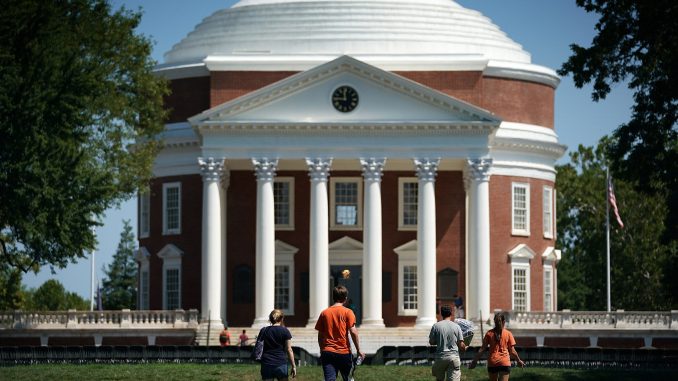
Virginia is a very purple state, evenly divided between conservatives and liberals, but its universities are not equally balanced ideologically.
A simple way to gauge how “woke” universities are is to search for certain terms in their course catalogs. The more “woke” words that appear in the titles and descriptions of courses and programs, the more left-leaning the university is likely to be.
Harry R. Lewis, a computer science professor and former dean of Harvard College, recently did this to demonstrate how radical Harvard had become. Terms like “social justice,” “decolonization” and “oppression” have become ubiquitous in its course catalog.
Replicating Lewis’ approach for the 15 public universities in Virginia reveals some unexpected patterns.
The term “social justice” appears 72 times in the course catalog of James Madison University, 59 times for George Mason University, and 53 times for Virginia Commonwealth University. None of the other dozen public universities in Virginia have even half as many mentions of “social justice” in their catalogs. Virginia’s two historically black public universities, Norfolk State University and Virginia State University, don’t even mention “social justice” a dozen times in their catalogs.
But these universities are not all the same size and may not have an equal number of courses and programs described in their catalogs. For a better apples-to-apples comparison, we can also look at how often more traditional terms, such as “Constitution,” appear in their catalogs.
The term “social justice” appears in the James Madison University catalog 4.5 times as often as the term “Constitution.” For Virginia Commonwealth University, “social justice” is 3.1 times as common as “Constitution.” At George Mason University, it is 2.6 times as common.
For the historically black institutions, Norfolk State and Virginia State, their catalogs mention “Constitution” more often than they do “social justice.” The same is true for the flagship University of Virginia, as well as at Old Dominion University, Christopher Newport University, Longwood University and Virginia Military Institute.
In fact, VMI does not have a single course or program that includes the terms “social justice,” “decolonization,” “liberation,” “white supremacy” or “intersectionality” in their titles or descriptions, but it does have 13 with the term “Constitution.” By contrast, William & Mary University’s catalog mentions these woke terms 17 times. The Constitution? Only three times.
Obviously, these are not perfect proxies for how woke universities are, but they roughly give us a flavor of the ideological tilt of their academic offerings.
And it’s important to note that benign-sounding terms such as “social justice” are often anything but benign.
In their highly useful “cheat sheet for policymakers,” titled “Responding to Social Justice Rhetoric,” authors Bruce Gilley, Peter Boghossian, and James Lindsay explain that “social justice,” as the woke define it, means “group entitlements, which is the reframing of particular political demands as universal moral imperatives [and] a denial of just rewards to individuals who follow the law.”
The relative frequency of woke terms such as “social justice” in course and program titles, and descriptions that feature more traditional topics, such as the Constitution, does not seem to be related to the size of the university or its demographic composition.
Woke universities in Virginia come in all sizes, from very large ones such as George Mason, James Madison and Virginia Commonwealth to very small ones, such as William & Mary and the University of Mary Washington. And those with greater ideological balance are as big as the University of Virginia and as small as VMI.
The fact that Virginia’s two public historically black institutions, as well as some universities with relatively high percentages of low-income students (as measured by Pell Grants), such as Longwood and Old Dominion universities, have very little interest in woke courses and programs, suggests that this is not being driven by student demographics or demand.
When universities go woke, it’s the result of decisions made by their leaders. And it’s their leaders who need to be held accountable.
University presidents, provosts and deans make choices about how to allocate resources, hire additional faculty and create new academic programs. Boards of trustees approve those decisions and review the performance of senior administrators. Those decisions determine whether a university has dozens of social justice courses and programs and only a handful on the Constitution.
It’s time for us all to remember that these universities are public institutions and are ultimately accountable to the residents of Virginia. If they deviate too far from what Virginians want, voters will demand that their political representatives appoint administrators who will restore ideological balance.
Have an opinion about this article? To sound off, please email letters@DailySignal.com and we’ll consider publishing your edited remarks in our regular “We Hear You” feature. Remember to include the url or headline of the article plus your name and town and/or state.

